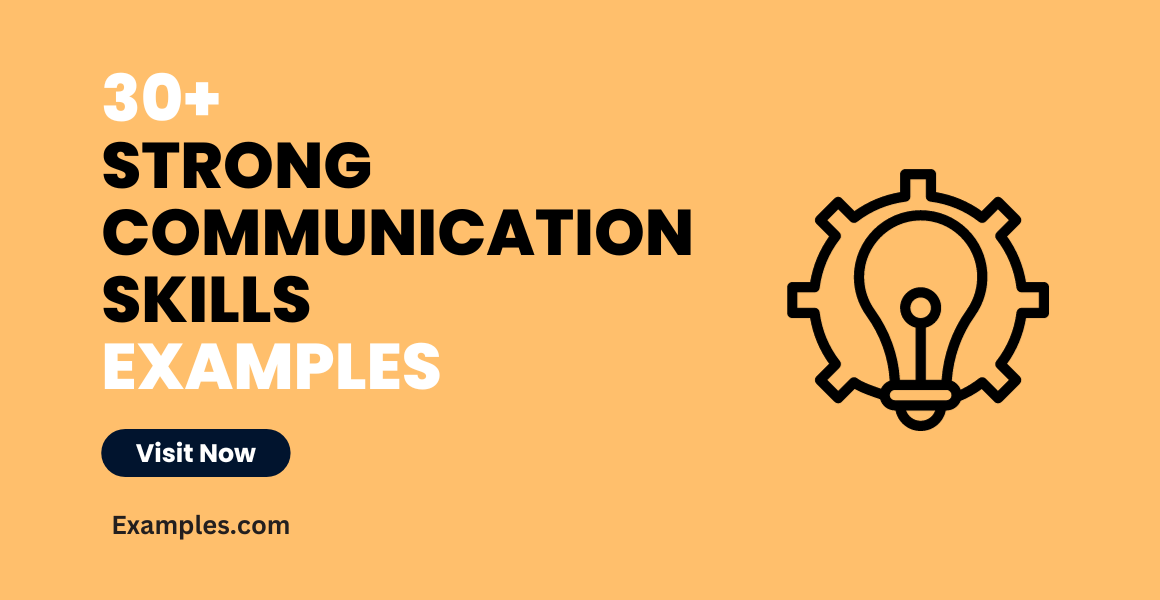Strong Communication Skills
Discover the secrets to mastering strong communication skills with our comprehensive guide, filled with sentence examples that bring concepts to life. In today’s interconnected world, the ability to communicate effectively is more crucial than ever. Whether it’s in a professional setting, within personal relationships, or in everyday interactions, our guide offers valuable insights and practical communication examples. Elevate your ability to express, understand, and connect by exploring various facets of communication skills through this detailed and user-friendly resource.
30 Strong Communication Skills Examples
In today’s fast-paced world, effective communication is key to success in both personal and professional arenas. Our list of 30 Strong Communication Skills Examples showcases a diverse range of techniques that can significantly enhance your ability to communicate. These examples are not just theoretical concepts; they are practical, easy-to-apply strategies that can transform your interactions. From active listening to assertive expression, each skill is explained with a clear, real-world example, helping you to understand how to apply these skills in various situations.
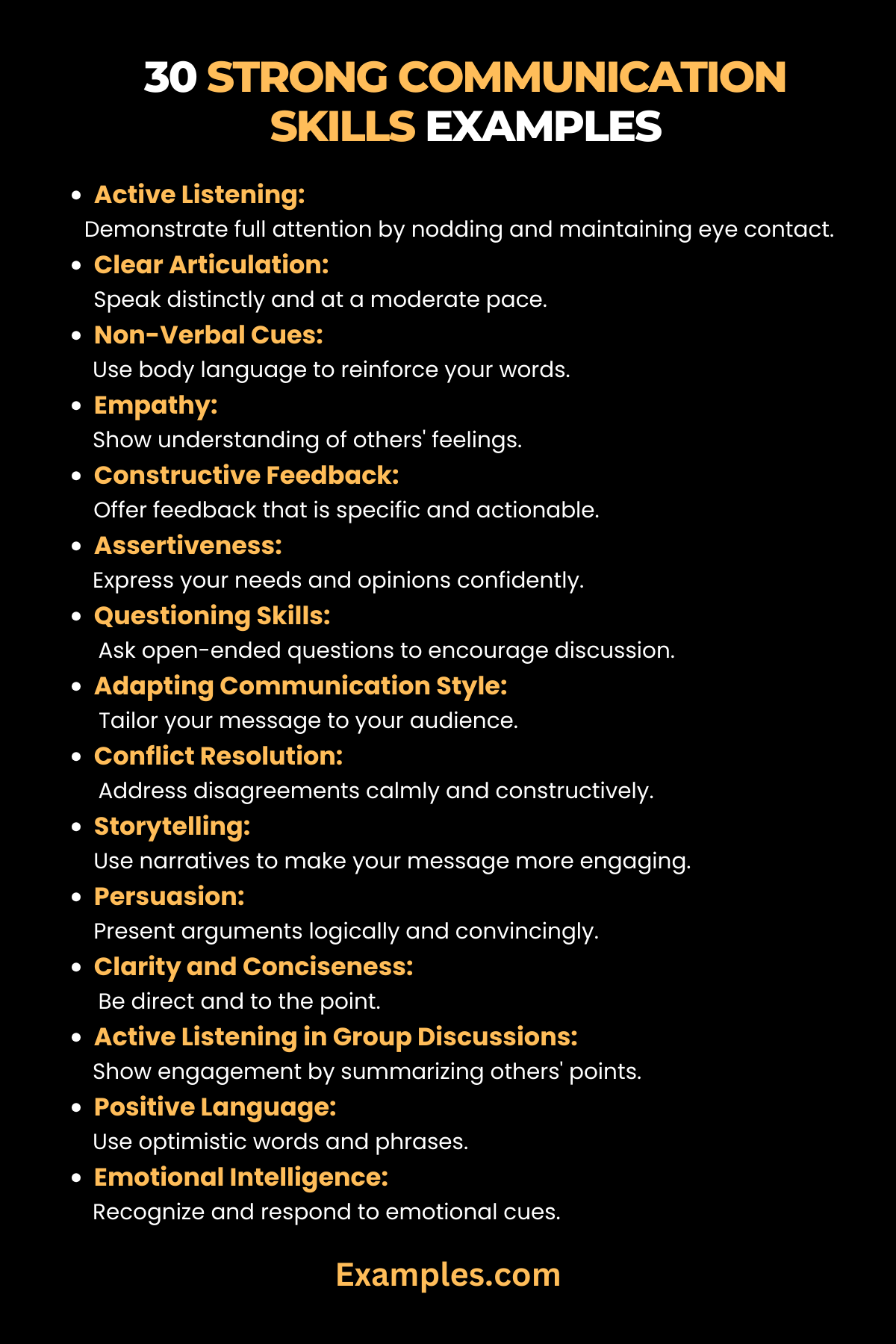
- Active Listening: Demonstrate full attention by nodding and maintaining eye contact.
Example: In a meeting, paraphrase the speaker’s points to show understanding and engagement. - Clear Articulation: Speak distinctly and at a moderate pace.
Example: During a presentation, enunciate each word clearly to ensure your message is understood. - Non-Verbal Cues: Use body language to reinforce your words.
Example: In an interview, maintain an open posture and use hand gestures to emphasize points. - Empathy: Show understanding of others’ feelings.
Example: In a conflict, acknowledge the other person’s perspective before presenting your own. - Constructive Feedback: Offer feedback that is specific and actionable.
Example: When reviewing a colleague’s work, provide concrete suggestions for improvement. - Assertiveness: Express your needs and opinions confidently.
Example: In a team meeting, clearly state your ideas without overshadowing others. - Questioning Skills: Ask open-ended questions to encourage discussion.
Example: In a brainstorming session, use questions like “What do you think about this approach?” - Adapting Communication Style: Tailor your message to your audience.
Example: When explaining a technical concept to non-experts, use simpler terminology. - Conflict Resolution: Address disagreements calmly and constructively.
Example: In a dispute, focus on finding common ground rather than winning the argument. - Storytelling: Use narratives to make your message more engaging.
Example: In a sales pitch, share a customer success story to illustrate your point. - Persuasion: Present arguments logically and convincingly.
Example: In a negotiation, use data and facts to support your position. - Clarity and Conciseness: Be direct and to the point.
Example: In emails, use short sentences and bullet points to convey your message efficiently. - Active Listening in Group Discussions: Show engagement by summarizing others’ points.
Example: In a group discussion, periodically summarize what has been said to ensure everyone’s views are understood. - Positive Language: Use optimistic words and phrases.
Example: Instead of saying “This won’t work,” say “Let’s find a solution that works.” - Emotional Intelligence: Recognize and respond to emotional cues.
Example: If a colleague seems upset, offer support or space as appropriate. - Public Speaking Skills: Engage your audience with eye contact and enthusiasm.
Example: During a speech, use pauses for effect and to let key points sink in. - Negotiation Skills: Aim for win-win outcomes.
Example: In a business deal, propose solutions that benefit both parties. - Cultural Sensitivity: Respect cultural differences in communication styles.
Example: In an international meeting, be mindful of varying norms of politeness and expression. - Effective Email Communication: Use a clear subject line and a professional tone.
Example: Start emails with a polite greeting and get straight to the point. - Telephone Etiquette: Speak clearly and be courteous.
Example: During phone calls, introduce yourself and ask if it’s a good time to talk. - Listening for Feedback: Accept feedback without becoming defensive.
Example: When receiving criticism, thank the person for their input and consider how to use it constructively. - Encouraging Participation: Invite quieter individuals to share their thoughts.
Example: In meetings, directly ask for opinions from those who haven’t spoken much. - Using Humor Appropriately: Lighten the mood without offending.
Example: Use light, relevant humor in presentations to keep the audience engaged. - Written Communication: Craft well-structured written messages.
Example: In reports, use headings and subheadings to organize content clearly. - Handling Difficult Conversations: Stay calm and focused on resolution.
Example: In tough discussions, keep your tone neutral and avoid placing blame. - Giving Instructions: Provide clear, step-by-step directions.
Example: When delegating tasks, outline specific expectations and deadlines. - Presentation Skills: Use visuals to complement your speech.
Example: In PowerPoint presentations, use charts and images to illustrate key points. - Collaborative Communication: Foster a team-oriented dialogue.
Example: Encourage team members to share ideas and build on each other’s suggestions. - Respectful Disagreement: Express differing opinions politely.
Example: When you disagree, start with “I see your point, but have you considered…?” - Consistent Follow-Up: Ensure ongoing communication.
Example: After meetings, send summary emails to confirm actions and next steps.
Strong Communication Skills in the Workplace
In the modern workplace, strong communication skills are pivotal for success and collaboration. Effective communication fosters a productive environment, enhances team dynamics, and leads to better problem-solving. This guide focuses on enhancing workplace interactions through Communication Skills at Workplace and Communication Skills for Teams, ensuring that every professional can communicate their ideas clearly and effectively.
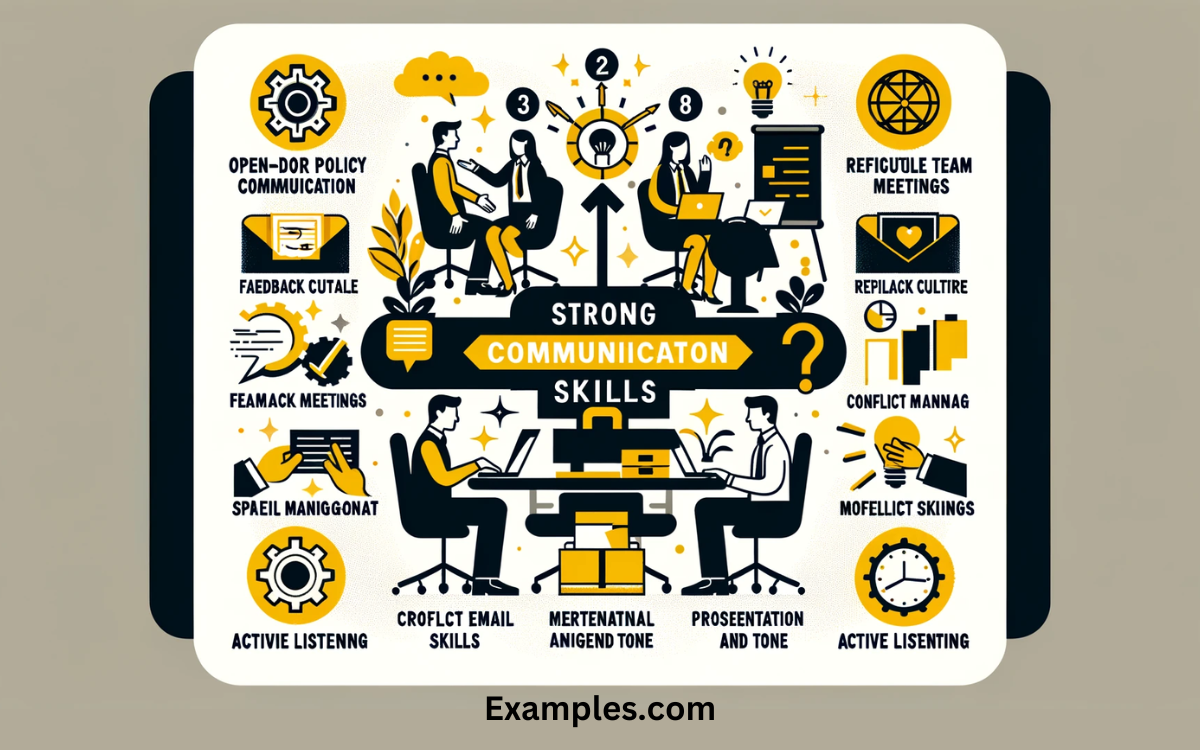
- Open-Door Policy Communication: Encourage an environment where employees feel comfortable sharing ideas and concerns.
Example: Managers can schedule regular check-ins to provide a platform for open dialogue. - Regular Team Meetings: Facilitate structured meetings to discuss goals and updates.
Example: Hold weekly team meetings to review progress and address any challenges collectively. - Feedback Culture: Create a culture where constructive feedback is valued and encouraged.
Example: Implement monthly feedback sessions where team members can offer and receive constructive criticism. - Effective Email Etiquette: Master the art of concise and clear email communication.
Example: Use specific subject lines and bullet points to ensure your emails are easily understandable. - Cross-Departmental Communication: Promote inter-departmental interactions for broader perspectives.
Example: Organize cross-departmental meetings to discuss collaborative projects and shared goals. - Conflict Management Skills: Handle workplace conflicts with diplomacy and professionalism.
Example: When a dispute arises, focus on the issue, not the individuals, and work towards a mutually beneficial solution. - Mentoring and Coaching: Develop communication channels for mentoring relationships.
Example: Senior staff can offer regular mentoring sessions to guide and develop junior team members. - Presentation Skills in Meetings: Enhance your ability to present ideas compellingly.
Example: Use storytelling and visual aids in presentations to make your points more engaging and memorable. - Professional Language and Tone: Maintain a professional demeanor in verbal and written communication.
Example: Use respectful language and a positive tone in all forms of workplace communication. - Active Listening during Team Discussions: Show engagement and understanding in team conversations.
Example: During team discussions, summarize what others have said to show that you are actively listening and understanding their points.
Strong Communication Skills in a Relationship
Effective communication is the cornerstone of healthy and strong relationships. This segment delves into the importance of empathy, understanding, and clarity in personal interactions. Focusing on Communication Skills for Couples and Communication Skills in Marriage, these skills are essential for building a deeper connection and resolving conflicts in a respectful and loving manner.
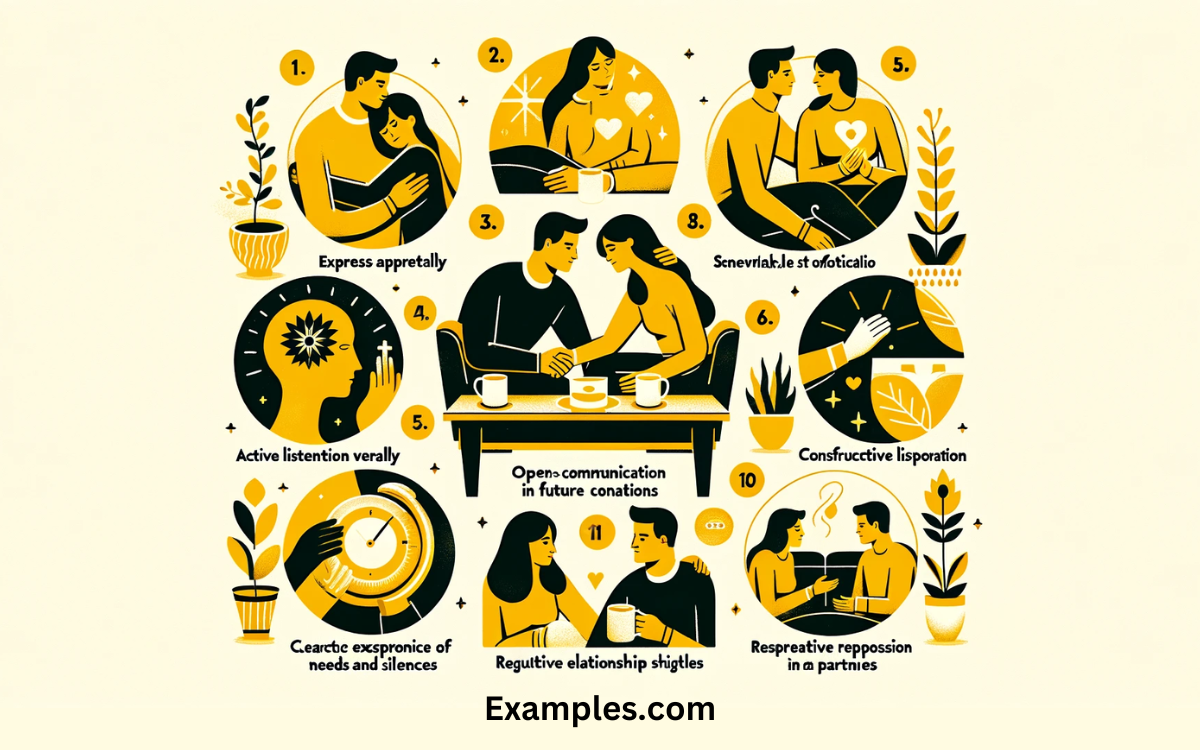
- Expressing Appreciation Verbally: Regularly communicate gratitude and appreciation.
Example: Tell your partner, “I really appreciate how you always listen to me,” to reinforce positive actions. - Active Listening in Emotional Conversations: Give undivided attention during sensitive discussions.
Example: In emotional talks, refrain from interrupting and respond with understanding phrases like “I see how that could be upsetting.” - Open Discussions about Future Plans: Share and respect each other’s visions for the future.
Example: Discuss long-term goals together, saying “Let’s talk about our plans for the future and see where we align.” - Nonverbal Communication of Affection: Show love through actions.
Example: Use gestures like a reassuring hand squeeze to convey support without words. - Clear Expression of Needs and Boundaries: Directly state personal needs and limits.
Example: Say, “I need some alone time to recharge; let’s reconvene in a couple of hours,” to set healthy boundaries. - Constructive Conflict Resolution: Tackle disagreements with the aim of finding solutions.
Example: During arguments, focus on the issue, saying “Let’s find a solution that works for both of us.” - Regular Relationship Check-Ins: Schedule times to discuss the health of the relationship.
Example: Initiate conversations like, “Let’s talk about how we’re feeling in our relationship right now.” - Empathetic Response to Partner’s Struggles: Show genuine concern and understanding.
Example: When your partner is struggling, say “I’m here for you, tell me what you need” to offer support. - Balancing Conversation and Silence: Understand when to talk and when to enjoy silence together.
Example: In moments of quiet, say “I love these peaceful moments with you,” to acknowledge the comfort in silence. - Respectful Tone in Discussions: Maintain a respectful and caring tone, even in disagreements.
Example: In heated discussions, consciously moderate your tone, saying “I might be upset, but I still respect and love you.”
Importance of Strong Communication Skills
Strong communication skills are indispensable in today’s interconnected world, profoundly impacting personal, professional, and societal interactions. This section highlights the Importance of Communication Skills, underscoring how they facilitate understanding, foster relationships, enhance teamwork, and improve conflict resolution. Effective communication is not just about speaking but also about listening, understanding, and responding appropriately.
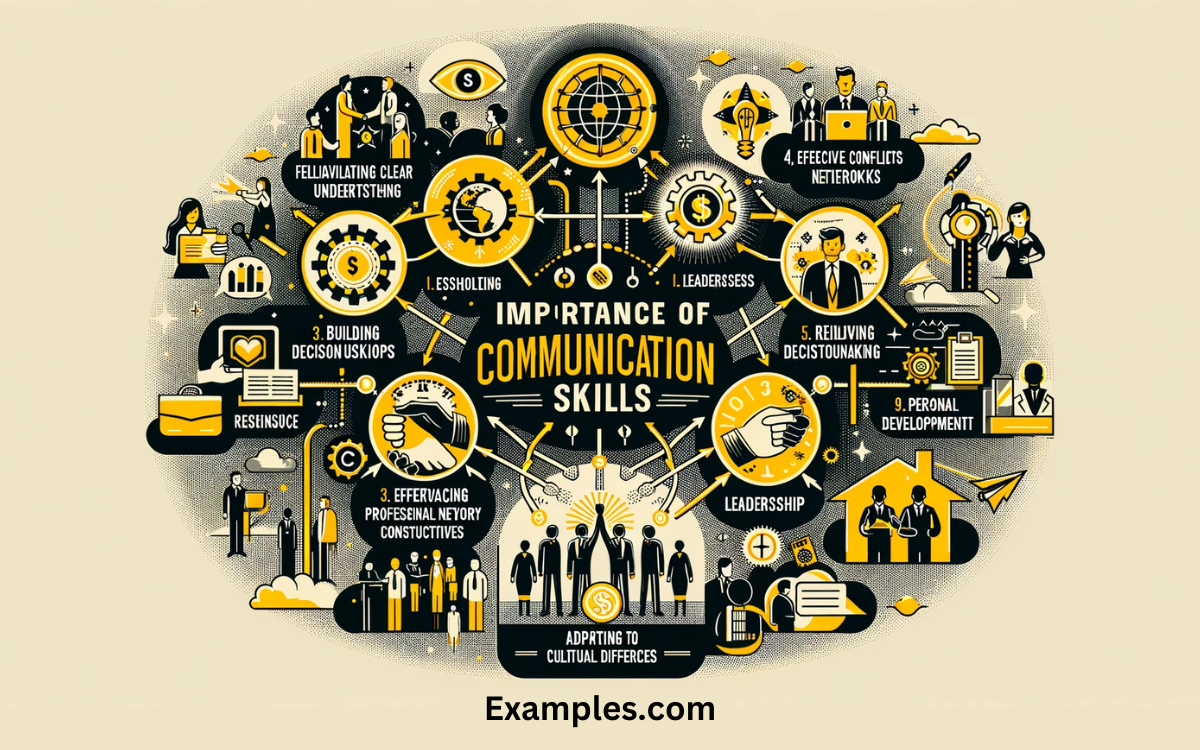
- Facilitating Clear Understanding: Ensure messages are understood as intended.
Example: When explaining a concept, ask, “Does this make sense to you?” to ensure clarity. - Building Trust in Relationships: Use honest and open communication to build trust.
Example: In conversations, say, “I value your trust and will always be honest with you.” - Enhancing Team Collaboration: Communicate effectively to improve teamwork.
Example: During team projects, regularly update and encourage feedback by saying, “Let’s keep each other informed on our progress.” - Resolving Conflicts Constructively: Use communication to navigate and resolve disputes.
Example: In disagreements, say, “Let’s discuss this and find a solution that works for both of us.” - Improving Decision-Making: Share and gather information to make informed decisions.
Example: When making decisions, say, “Let’s weigh our options and discuss the pros and cons.” - Building Professional Networks: Use communication to connect with others in your field.
Example: At networking events, introduce yourself with, “I’m interested in learning about your work.” - Effective Customer Relations: Build strong customer relationships through clear communication.
Example: With clients, say, “Your satisfaction is important to us; let us know how we can improve.” - Leadership and Influence: Lead and motivate others with impactful communication.
Example: As a leader, inspire your team by saying, “Together, we can achieve our goals.” - Personal Development and Growth: Use self-reflection and feedback for personal improvement.
Example: Ask for feedback with, “I’m looking to improve; what are your thoughts on this?” - Adapting to Cultural Differences: Be mindful of cultural variations in communication.
Example: In diverse settings, say, “I respect our differences and am eager to learn from you.”
What is Your Strongest Communication Skill?
Identifying your strongest communication skill is crucial for personal and professional growth. This self-awareness enables you to leverage your strengths effectively while working on areas that need improvement. Strong communication skills encompass a range of abilities, from active listening to clear articulation. But how do you determine which of these is your forte?
First, consider the various aspects of communication: verbal, non-verbal, listening, and written. Reflect on your interactions: are you more adept at conveying your thoughts verbally, or does your strength lie in empathetically listening to others? Perhaps your proficiency shines in non-verbal cues, or you excel in crafting well-structured written messages.
To identify your strongest communication skill, seek feedback from peers, friends, or mentors. Ask them in which communication aspects they think you excel. Also, introspect on your past experiences. Think about situations where you felt most comfortable and effective in communicating. Was it during a presentation, in a one-on-one conversation, or while writing an email?
Another method is to analyze your comfort level in different communication settings. Do you find it easier to express yourself in group discussions or in writing? Your ease in these situations often points to your strongest skill.
Remember, each communication skill plays a vital role, and recognizing your strongest one doesn’t undermine the importance of others. It simply helps you understand your natural inclination and how you can use it to your advantage, while also identifying areas for further development.
In a world where communication skills are highly valued, knowing your strongest asset in this arena can be a significant advantage. It not only enhances your interactions but also boosts your confidence in various settings. Whether it’s in a professional environment or personal relationships, understanding and utilizing your primary communication strength can lead to more effective and fulfilling interactions.
What are the Benefits of Strong Communication Skills?
Strong communication skills are a vital asset in both personal and professional life, offering numerous benefits that enhance interactions and relationships. This comprehensive guide delves into the multifaceted advantages of possessing strong communication skills, particularly optimized for the keyword “communication skills.”
- Improved Relationships: Effective communication is fundamental in building and maintaining healthy relationships, both personal and professional. By expressing thoughts and feelings clearly, individuals can develop deeper connections and mutual understanding with others.
- Enhanced Professional Success: In the workplace, strong communication skills facilitate better teamwork, leadership, and conflict resolution. They play a crucial role in career advancement, as clear communication is often linked to effective management and leadership capabilities.
- Effective Conflict Resolution: The ability to communicate effectively is key in resolving misunderstandings and conflicts. By articulating points of view and actively listening to others, individuals can find common ground and mutually beneficial solutions.
- Increased Confidence and Self-Esteem: Good communication skills boost confidence in social situations and professional settings. Being able to articulate thoughts and ideas effectively can lead to increased self-esteem and a sense of accomplishment.
- Better Decision Making: Clear communication helps in gathering information, discussing options, and making informed decisions. Whether in a team or individual context, the ability to communicate effectively leads to more sound and rational decision-making.
- Enhanced Leadership Skills: Effective leaders are often excellent communicators. Strong communication skills allow leaders to inspire, motivate, and direct teams, as well as manage change and challenges within organizations.
- Greater Persuasive Power: In business and personal scenarios, the ability to persuade others is a valuable skill. Strong communication enhances the ability to influence others, whether it’s selling a product, pitching an idea, or simply convincing someone of a point of view.
- Improved Social Skills: Strong communicators can navigate various social situations with ease. From casual conversations to formal presentations, effective communication skills enhance social interactions and build stronger networks.
- Enhanced Learning and Growth: Communication is a two-way process that involves listening as well as speaking. Strong communication skills foster a learning environment where individuals can share knowledge and learn from others.
- Cross-Cultural Understanding: In an increasingly globalized world, strong communication skills aid in overcoming cultural barriers. They enable individuals to interact effectively with people from diverse backgrounds, fostering global understanding and cooperation.
In conclusion, strong communication skills are an invaluable tool, offering benefits that extend far beyond the surface. They are instrumental in achieving personal fulfillment, professional success, and effective social interaction. By focusing on and developing these skills, individuals can unlock their full potential in various aspects of life.



